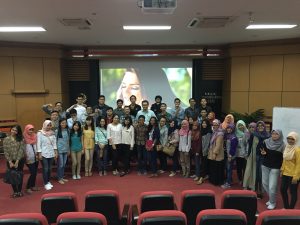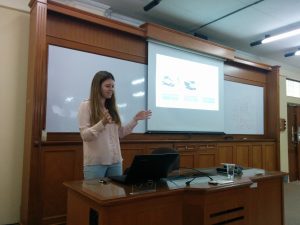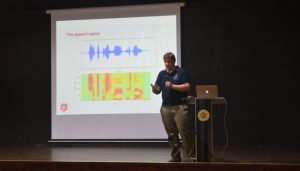And the truth shall set you free: Linux & Kernel
May 21st, 2016 Posted in Misc Posts | no comment »Meet Linus Torvalds the mind behind Linux then powers the internet and android
How Linux is built
What is a Kernel
Meet Linus Torvalds the mind behind Linux then powers the internet and android
How Linux is built
What is a Kernel
Kejadian memalukan pada 29 Juli 2013 dekat toserba Schorling, OH, US

Pak Jokowi kembali ke Almamater nya
 SIM class in the early part of 2016 semester was quite memorable
SIM class in the early part of 2016 semester was quite memorable
Some notable students are: Farhan Widagdo, RMSP Alam, Jessica Kuron, Adam Kurnia, Kevin Emilio, Wiratri Rahmawerdani, Tyas Toar, Sabrina, Robin (Class captain).

Dr.Frutos during FGD session at FEB UGM
Today we had an excellent opportunity to meet Dr. Frutos
This meeting signifies the milestone of establishing a cotutelle program between FEB UGM and Univeristy of Montpellier in France.
The meeting was held at Hyatt Regency Hotel

Seperti diberitakan dalam laman www.ugm.ac.id, perusahaan teknologi terkemuka, Google, menjalin kerja sama dengan UGM untuk mengembangkan aplikasi Text-To-Speech (TTS) Bahasa Jawa sebagai bagian dari riset mereka yang diberi nama Project Unison. Melalui kerja sama ini UGM akan memfasilitasi proses pengumpulan rekaman tuturan bahasa Jawa untuk membangun database yang diperlukan untuk aplikasi tersebut.
“Sangat penting bagi kami untuk bekerja sama dengan universitas karena proses pengumpulan data, khususnya untuk bahasa-bahasa daerah, memang sangat sulit sehingga tidak dapat kami kerjakan sendiri,” ujar Senior Program Manager Google Research for Low Resource Languages, Linne Ha, dalam Seminar Digitalisasi Bahasa Jawa dengan Google ASR dan TTS, Rabu (4/5) di Auditorium Fakultas Ilmu Budaya UGM.
Project Unison merupakan riset yang dimulai Google pada tahun 2015 untuk mengeksplorasi pendekatan inovatif dalam mengembangkan aplikasi Text-To-Speech untuk bahasa-bahasa yang dikategorikan sebagai low resource language, seperti berbagai bahasa daerah yang ada di dunia. Di Indonesia sendiri, bahasa Jawa menjadi bahasa daerah pertama yang akan dilakukan digitalisasi mengingat penuturnya yang terbilang cukup banyak.
Meski demikian, tambah Linne, dialek bahasa Jawa yang sangat beragam menjadi tantangan tersendiri bagi pembuatan aplikasi ini. “Keragaman dalam bahasa Jawa menjadi tantangan tersendiri. Antara penutur bahasa Jawa di daerah ini dengan daerah yang lain bisa punya dialek yang berbeda. Namun, kami berusaha mengumpulkan sebanyak mungkin data untuk membangun identifikasi suara yang mampu menangkap berbagai dialek yang berbeda,” jelasnya.
Proses pengumpulan data suara dalam proyek ini tidak menggunakan cara yang biasa dilakukan, yaitu dengan melibatkan seorang voice talent serta menggunakan studio profesional, melainkan dengan merekam suara dari penutur dan lingkungan yang beragam untuk menangkap berbagai dialek-dialek khas dari bahasa tersebut. Selain itu, metode ini juga digunakan untuk membuat suara yang terdengar layaknya suara manusia tetapi tidak mudah diidentifikasi kepada seorang pribadi tertentu.
Kerja sama ini juga menjadi salah satu wujud partisipasi UGM dalam melestarikan budaya lokal. Selain untuk mengakomodasi keperluan penutur bahasa daerah, proyek ini juga dikerjakan sebagai suatu cara untuk melestarikan Bahasa Jawa yang saat ini penggunaannya mulai menurun di kalangan pemuda. “Sekarang tidak banyak orang yang masih menggunakan bahasa Jawa. Jangan sampai beberapa tahun ke depan bahasa Jawa menjadi bahasa yang hanya dikenal oleh para akademisi,” ujar Kepala Seksi Pusat Data dan Keamanan, Direktorat Sistem dan Sumber Daya Informasi (DSSDI) UGM, Dedi Eko Yunanto Priyadi, S.T.
Ia pun menekankan pentingnya kerja sama ini sebagai awal dari proyek riset Google di Indonesia. “Kerja sama ini akan menjadi contoh bagi digitalisasi bahasa daerah yang ada di Indonesia. Jika proyek kali ini berjalan baik, maka akan membuka jalan agar aplikasi yang sama dapat dikembangkan untuk bahasa daerah lainnya,” tambahnya
Sumber: http://ugm.ac.id/id/berita/11614-ugm.dan.google.kembangkan.aplikasi.text.to.speech.bahasa.jawa
Please follow this link
When I look at digital money, I see a revolutionary technology that allows people or institutions to transfer funds instantly, securely and without a middleman. Digital money can potentially expand international commerce, support financial inclusion, and transform how we shop, save and do business in ways we probably cannot even yet fully understand. From programmable money to new forms of e-commerce, here are five ways the new technology will change the worl
Faster, cheaper bank transfers
The way banks move money today is archaic. International bank transfers can take up to a week, with correspondent banks and country-specific clearing houses involved at both ends. Even the cross-border sharing of payment data faces challenges and frictions. By using a digital currency such as bitcoin, bank transfers could be made instantly, cheaply and safely. In fact, such transfers could even happen without using new currencies. Ripple Labs, for which I am an adviser, supports a protocol that allows clients to transfer funds from one currency to another (say, dollars to euros) using a secure digital ledger. Their technology moves money around the globe in seconds by first finding the most efficient path between trading partners, where the path might consist of a series of transactions among foreign exchange traders who have accounts in a variety of banks, and then confirming all required transactions simultaneously.
A boost to global remittances
Every year, migrants from developing countries send home more than $500 billion in remittances, a sum that exceeds foreign direct investment. With total fees for international transfers averaging 6-10% for sending $200, the burden on some of the world’s most vulnerable people is substantial. Technology has the potential to help these transfers become fast and cheap. Using virtual currency, private users could even send money directly to their families via mobile phone, with the only remaining fees being those charged by the currency exchanges. While traditional money transfer companies have to carry capital to compensate for delays in international money movement, capital requirements are much lower for firms using digital currencies. Of course, capital carrying costs and the cost of money movement comprise only part of the cost for remittance businesses. Nonetheless, reducing these costs might make it easier for smaller players to enter and establish new remittance corridors or for existing players to serve smaller towns or new countries.
Safe money for the poor
The explosion of mobile technology in Africa has already shown that developing countries can lead when it comes to sophisticated technology. Estimates suggest that 60% or more of commerce in Kenya takes place using mobile phone credits as a medium of exchange. Anyone with a mobile phone can store money there, and send credits to another user. The problem is that the fees are large: cashing out has historically cost as much as 20%, although the widespread acceptance of the credits means that many consumers are able to spend the credits directly without incurring large fees. Digital currencies could become another convenient and safe form of payment in countries where most citizens don’t have bank accounts. While using bitcoin as a second currency in a country would expose citizens there to a certain amount of currency risk, it might be better than the existing options, particularly in high-inflation countries. For example, it would be physically safer than storing cash at home or buying gold jewellery. In addition, someone holding bitcoin could exchange it for a more stable currency on one of the global bitcoin exchanges. In this way, it could expand access to international financial markets, allowing even the unbanked a way to save and protect against inflation. One implication may be that capital controls become harder to enforce.
Unleashing the potential of e-commerce
Today, concerns over credit card fraud are forcing many online merchants to turn away good business. Such fraud is more common in global transactions, and so many firms do not accept international payments. With a digital currency such as bitcoin, the transfer cannot be undone once it has been made. This eliminates the risk of fraud for merchants and thus allows them to sell worldwide. And since virtual currencies let customers send funds as easily as email, online shopping would turn into a much smoother process. Digital currency could also allow small businesses in developing countries to engage more in global e-commerce. Latin American vendors could sell hand-crafted goods globally, Chinese teenagers could offer Mandarin tutoring over Skype, and African firms wanting to market their products through online advertising marketplaces would have a payment option that is unavailable today. Small value transactions are a particularly salient use case, as low transaction fees could enable low-value in-app purchases or micro-payments for reading online news articles from media outlets around the globe.
Programmable money and smart contracts
Once an asset is purely digital, it can be moved in automated ways. This paves the way for “programmable money” and “smart contracts”. One practical example would be escrow accounts. Such accounts are already used in large transactions, such as property deals. The buyer puts money into escrow, and it only goes to the seller when he or she hands over the title to the property. In the digital age, where the issue of trust can be a key impediment for individuals wishing to transact at arm’s length, this system could be used for much smaller sums. Another example is multisig, where money can only be disbursed from an account when multiple individuals authenticate. This could be used to prevent the theft of digital funds, but it could also help firms ensure that money is not “lost” or stolen when it moves across borders, between divisions of a firm, or among charitable organizations and contractors in developing countries.
Programmable money could also have a role in much more complex contracts, such as financial contracts involving multiple parties and complex derivatives. You might put some money in a financial contract which will pay out according to what happens to certain stock prices. A computer program could be linked to stock prices from the Bloomberg terminal feed and then, depending on what happens to certain stocks or certain combinations of stocks, different individuals receive funds.

Best time to drink tea is in the evening between 16:00 – 18:00